China is hosting its first in-person summit with Central Asian leaders starting one day before the Group of Seven nations convenes for its annual summit in Japan.
Chinese President Xi Jinping is expected to promote economic engagement and increased security ties with Kazakhstan, Uzbekistan, Kyrgyzstan, Tajikistan and Turkmenistan during talks Thursday and Friday in China’s western city Xian.
Beijing’s first summit with those nations last year, held virtually, came as China continued to build out its Belt and Road Initiative, a massive investment in infrastructure aimed at boosting international trade and energy links.
Regional countries are interested in greater access to Chinese markets, and Beijing is seeking to boost its security and political ties.
US interests in Kazakhstan, Uzbekistan
In Kazakhstan and Uzbekistan, which have been America’s strategic partners for two decades, Washington also has strong interests in building ties.
Earlier this year U.S. Secretary of State Antony Blinken traveled to the capitals of both nations to promote investment and urge political reforms.

Uzbekistan President Shavkat Mirziyoyev, 65, and Kazakhstan President Kassym-Jomart Tokayev, 69, have pledged to transform their countries through substantial reforms, which Washington has encouraged.
In Astana on Feb. 28, Blinken said, “We look forward to seeing the additional concrete steps Kazakhstan will take to realize that agenda — expanding public participation in the political process, increasing government accountability, curbing corruption … and protecting human rights.”
He noted that American businesses have injected more than $50 billion into the Kazakh economy since 1991 when, like Uzbekistan, Kazakhstan became independent with the breakup of the Soviet Union.
On March 1 in Tashkent, Blinken said the U.S. wants to see full implementation of Mirziyoyev’s programs, stressing fundamental rights and assistance. He reiterated that America was making investments in the region that empower people “to shape their own future.”
Veteran U.S. diplomat George Krol, who served as ambassador to both countries, argues that the U.S. should not demand what he calls “textbook democracy” from these or other nations, given the difficulties some parts of the region have gone through.
“I don’t think they want to give political power to turn it over for unknown consequences,” Krol told VOA in an interview.
With neighbors such as China and Russia and the perception that democratic systems are not secure, “they look at Kyrgyzstan, Afghanistan or Pakistan … [and] they don’t want to follow.”
Krol, who is with Harvard University’s Davis Center for Russian and Eurasian Studies and an adjunct professor at the U.S. Naval War College, says Uzbek and Kazakh leaders have demonstrated they want to grant as much freedom as feasible without losing control.
“It wouldn’t pass the test of democracy in the eyes of political scientists or organizations in Europe and the United States. But in the context of Central Asia, it is different,” he said.
Neither regime tolerates opposition or political pluralism. All registered parties support the presidents without questioning their policies. Striving for some diversity of opinion may be a significant success, Krol suggests, asserting that the establishments in Uzbekistan and Kazakhstan still question the idea of opposition.
They fear that nationalist and extremist groups may rise along with those promoting hostilities toward Russia and China among others.
Following constitutional reforms last year, Tokayev was reelected for a new term of seven years. Mirziyoyev is following the same path, gearing up for snap elections on July 9, as allowed by the country’s constitution approved in an April 30 referendum.
Krol is not surprised these leaders, byproducts of the Soviet mentality, cling to power. As a diplomat in Belarus in 1994, he observed the election of Alexander Lukashenko, who is still running the country.
“It’s very hard to see that changing because these systems don’t produce leaders where they come out of a political milieu,” Krol said. “They are not selected by [free and fair] election.”

Central Asia suffers from concentrated nepotism. During Nursultan Nazarbayev’s three-decade rule in Kazakhstan, his offspring controlled the oil-rich country. In Uzbekistan, former strongman Islam Karimov’s eldest daughter Gulnara Karimova has been in prison on charges of organized crime and extortion since 2014.
Krol, who watched Nazarbayev’s and Karimov’s scandals up close, points out that Mirziyoyev’s eldest daughter Saida Mirziyoyeva is emerging as a key political figure, working in her father’s administration and representing him internationally. Senior U.S. diplomats have met Mirziyoyeva in Washington and Tashkent, acknowledging her relevance and influence. While Tokayev’s family is out of sight for now, the Uzbek leader’s family members, including his sons-in-law, surround him in various roles.
Krol doubts the U.S. is “truly optimistic that things would change” in these countries but sees the Biden administration “doing lip service … making all the sounds you would expect.”
Meanwhile, the Uzbek president says fighting corruption is a priority, renewing promises regarding the rule of law and judicial independence.
At the annual meeting of the European Bank for Reconstruction and Development in that Uzbekistan hosted in Samarkand on May 17, Mirziyoyev claimed that “the fundamental reforms that we began six years ago have completely changed the image of our country.”
Listing the successes of this government, such as eradicating forced labor and child labor, and integrating with neighbors to enhance stability and regional connectivity, he declared that international support has been key in implementing reforms and achieving results.
Source : VOA















